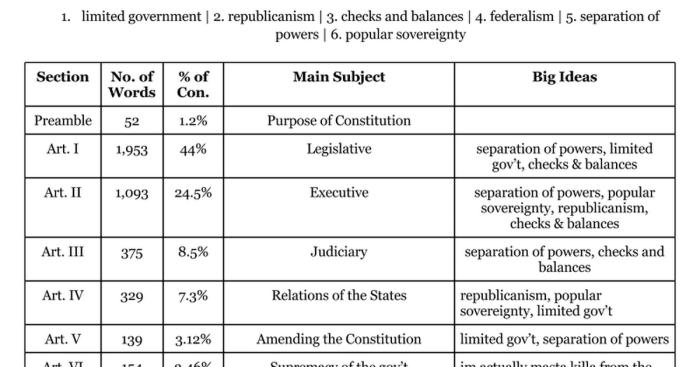The “Six Big Ideas in the Constitution Handout 3 Answer Key” serves as a comprehensive exploration of the fundamental principles that shape the United States Constitution. This guide delves into the core concepts that define the American system of government, providing a deeper understanding of its historical significance and enduring relevance.
From the concept of popular sovereignty to the protection of individual rights, this guide unravels the intricate tapestry of the Constitution, shedding light on its mechanisms and safeguards. It examines the delicate balance between government authority and individual liberty, highlighting the ingenious design that has ensured the longevity and resilience of the American republic.
Popular Sovereignty

Popular sovereignty is the concept that all political power resides in the people. In the Constitution, this principle is reflected in the Preamble, which states that the Constitution is “ordained and established by the People of the United States.”
Popular sovereignty is also reflected in the fact that all federal officials are elected by the people. The President is elected by the Electoral College, which is composed of electors chosen by the people of each state. Senators are elected by the people of their respective states, and Representatives are elected by the people of their respective districts.
Limited Government
Limited government is the principle that the government’s power is limited by the Constitution. This principle is reflected in the fact that the Constitution creates a system of checks and balances among the different branches of government.
For example, the President can veto laws passed by Congress, but Congress can override the President’s veto with a two-thirds vote. The Supreme Court can declare laws passed by Congress to be unconstitutional, but Congress can amend the Constitution with a two-thirds vote.
Separation of Powers
Separation of powers is the principle that the different branches of government have different powers and responsibilities. This principle is reflected in the fact that the Constitution creates three separate branches of government: the legislative branch, the executive branch, and the judicial branch.
The legislative branch is responsible for making laws. The executive branch is responsible for enforcing laws. The judicial branch is responsible for interpreting laws.
Judicial Review
Judicial review is the power of the courts to declare laws passed by Congress to be unconstitutional. This power is based on the principle that the Constitution is the supreme law of the land.
The Supreme Court has used the power of judicial review to strike down a number of laws passed by Congress, including laws that discriminated against racial minorities and laws that violated the freedom of speech.
Federalism, Six big ideas in the constitution handout 3 answer key
Federalism is the principle that power is divided between the federal government and the state governments. This principle is reflected in the fact that the Constitution creates a federal system of government.
The federal government has the power to make laws on certain matters, such as foreign affairs and national defense. The state governments have the power to make laws on all other matters.
Individual Rights
Individual rights are the rights that are guaranteed to all citizens by the Constitution. These rights include the right to free speech, the right to bear arms, and the right to a fair trial.
The Bill of Rights is the first ten amendments to the Constitution. It contains a number of provisions that protect individual rights.
Helpful Answers: Six Big Ideas In The Constitution Handout 3 Answer Key
What is the significance of popular sovereignty in the Constitution?
Popular sovereignty is the principle that the government derives its power from the consent of the governed. It ensures that the government is accountable to the people and that the people have the right to alter or abolish it if it becomes oppressive.
How does the Constitution prevent the government from becoming too powerful?
The Constitution establishes a system of checks and balances among the different branches of government. This system ensures that no one branch can become too powerful and that the power of government is divided and shared.
What is the role of judicial review in the Constitution?
Judicial review is the power of the courts to declare laws unconstitutional. This power ensures that the government acts within the limits of its authority and that the rights of individuals are protected.